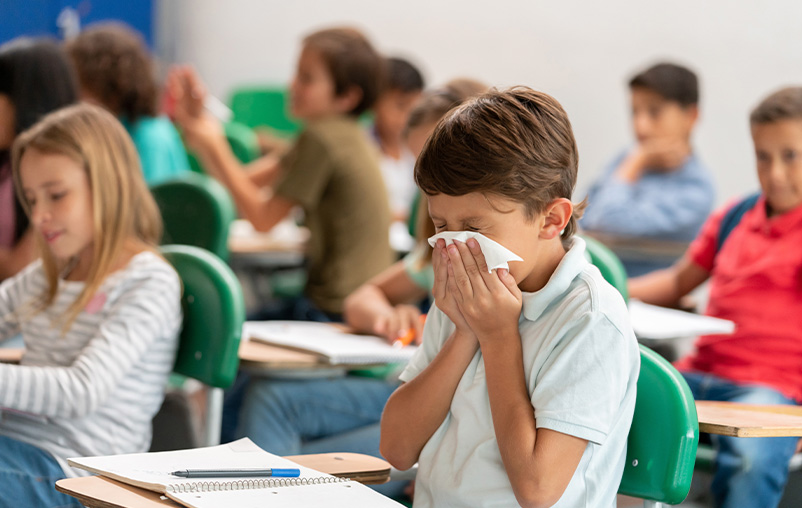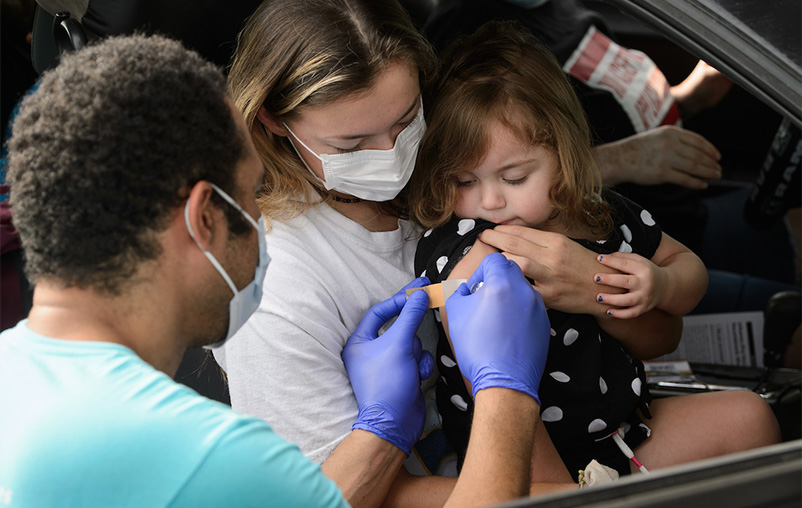This summer, for the first time in decades, the Centers for Disease Control and Prevention confirmed at least five cases of locally acquired malaria, a potentially fatal disease transmitted through the bite of a female anopheline mosquito. One patient resided in Cameron County, Texas, the other four in Florida.
The cases surprised health officials because the United States has mostly eliminated malaria. These were the first known cases to originate in the U.S. since 2003. Officials traced other cases to travelers who brought malaria with them after visiting other countries.
Alarm bells sounded again when the CDC reported outbreaks of flea-borne typhus. While the bacterial disease carried by infected fleas is usually not severe, some patients died or became seriously disabled. In Texas, doctors amputated the hands and feet of a man with typhus who developed sepsis.
Climate Change Makes Insect-Borne Illness More Common
Dr. Jason Bowling is chief epidemiologist at University Health and president of the Texas Infectious Disease Society. He says a warming climate appears to attract vector insects – bugs that ingest infected blood from a person or animal, then bite another host.
“As the climate continues to change, and there's more warming, we are seeing a potential expansion of these diseases,” Bowling said. “The vectors start to move from where they were before, because the (warming) climate makes it more favorable for them.”
Mosquito Season Is Getting Longer
Fleas and ticks transmit vector diseases, but Bowling says mosquitoes are the “number one bad actor.” And, if you think you are feeling their bite for longer periods each year, it’s not your imagination. A non-profit tracking the impact of warmer weather says from 1979 to 2022, 71% of U.S. locations saw the average mosquito season increase by 16 days.
Diseases Spread by Mosquitoes
West Nile
West Nile is the leading U.S. disease spread by mosquitoes. Most people will not develop symptoms from the virus. About 20% will recover quickly after developing fever, headache, body aches or a skin rash. The disease, however, can also attack the brain and spinal cord, resulting in muscle weakness, paralysis or death. A West Nile outbreak in 2003 led to the deaths of over 40 Texans.
Malaria
Malaria is a serious and sometimes fatal disease caused by a parasite transmitted through a mosquito bite. Some may experience high fevers and flu-like symptoms. Most diagnosed with malaria in our country were infected while living or traveling outside the United States.
Zika
Zika is a viral disease usually accompanied by mild flu-like symptoms, though it can also cause serious birth and brain defects for the unborn baby of a pregnant person. The bite of an infected mosquito spreads the illness, but it can also be transmitted to a partner during sex.
Other mosquito-borne diseases identified by the Texas Department of State Health Services include chikungunya, dengue, St. Louis encephalitis and western equine encephalitis.
Illnesses Spread by Fleas and Ticks
The long list of diseases spread by tick bites includes Lyme disease and Rocky Mountain spotted fever, which are rare in South Texas.
Here, fleas are a bigger concern because they can cause murine typhus.
Rodents, opossums and domestic cats are often the carriers that bring humans in contact with the fleas. The bacterial infection following a flea bite can occasionally lead to hospitalization, and if not promptly treated, to serious illness including life-threatening sepsis.
Diagnosing and Treating Diseases Transmitted by Insects
The symptoms for many of these sicknesses are similar. They are often described as flu-like, and may be accompanied by:
- Fever
- Headaches
- Muscle aches
- Nausea
- Rash
Bowling says patients need to see their primary care provider to get the right diagnosis and treatment.
“Many of these generally don't respond to standard antibiotics. For example, if you get penicillin, it's not going to touch murine typhus. You need anti-malaria medication for malaria. You need providers to make the diagnosis so you can get the appropriate treatment,” Bowling said.
Prevention Is Key
Avoiding insect bites is the best way to avoid sickness.
The CDC recommends the following to evade mosquitoes:
- Apply insect repellent.
- Wear long-sleeves and pants.
- Empty outdoor containers with water where mosquitoes can breed.
- Keep mosquitoes outside by keeping windows and doors shut. Use screens and air conditioning.
To prevent typhus, avoid contact with fleas and:
- Use products to keep fleas off your pets.
- Remove food sources and nesting locations near your home that attract wild animals.
- Do not feed or protect wild or stray animals.
Bowling says there’s no reason to panic if you are bitten by mosquitoes or fleas. Just be aware of any symptoms.
“If you get a mosquito bite or flea bite, that doesn't mean you are going to get these things. But, if you start to develop symptoms, after you have a bunch of mosquito or flea bites, get it checked out,” Bowling said.
Infectious Disease Care at University Health
Find care for infectious diseases like malaria, Zika, West Nile and more at University Health in San Antonio.





